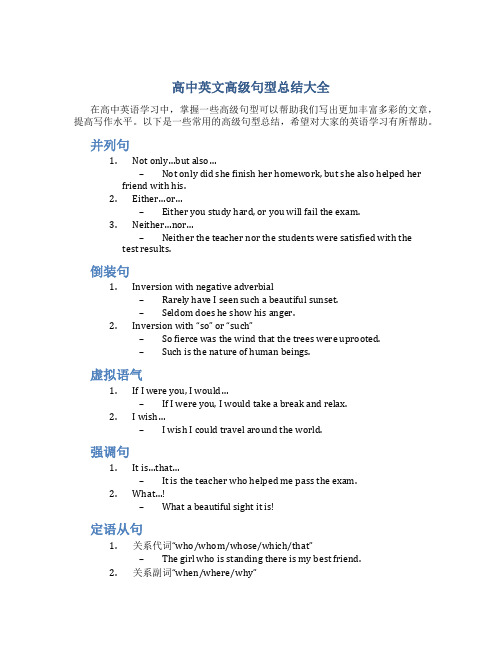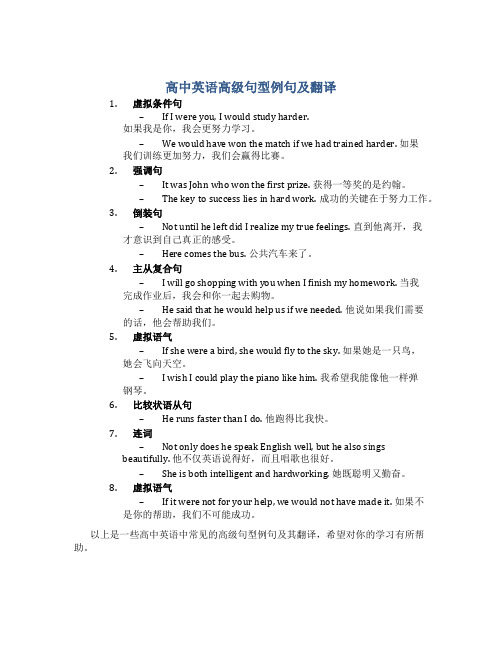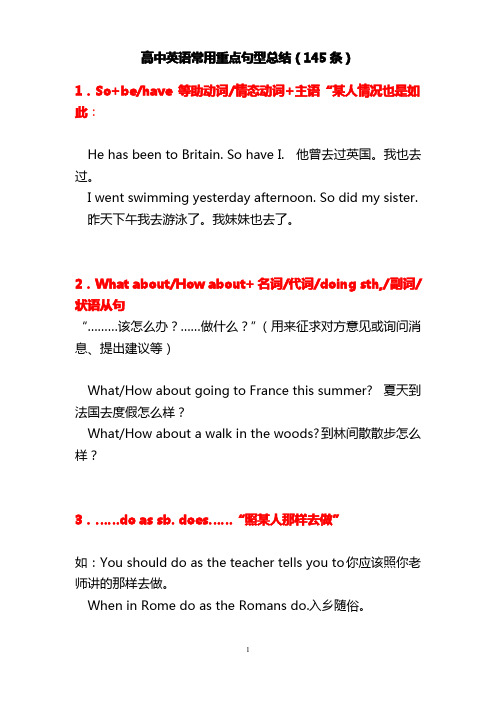高中英语句型归纳
高中英文高级句型总结大全

高中英文高级句型总结大全在高中英语学习中,掌握一些高级句型可以帮助我们写出更加丰富多彩的文章,提高写作水平。
以下是一些常用的高级句型总结,希望对大家的英语学习有所帮助。
并列句1.Not only…but also…–Not only did she finish her homework, but she also helped her friend with his.2.Either…or…–Either you study hard, or you will fail the exam.3.Neither…nor…–Neither the teacher nor the students were satisfied with the test results.倒装句1.Inversion with negative adverbial–Rarely have I seen such a beautiful sunset.–Seldom does he show his anger.2.Inversion with “so” or “such”–So fierce was the wind that the trees were uprooted.–Such is the nature of human beings.虚拟语气1.If I were you, I would…–If I were you, I would take a break and relax.2.I wish…–I wish I could travel around the world.强调句1.It is…that…–It is the teacher who helped me pass the exam.2.What…!–What a beautiful sight it is!定语从句1.关系代词“who/whom/whose/which/that”–The girl who is standing there is my best friend.2.关系副词“when/where/why”–I still remember the day when we first met.以上就是高中英文高级句型总结大全,希望大家能够在写作中灵活运用这些句型,提升自己的写作水平。
英语高中阶段最常用句型汇总

英语高中阶段最常用句型汇总1. It/ This is the first/ second/ third … time that … have done …这是某人第一/ 二/ 三……次做某事* It was the first time that … had done …基础句型1. as…as…与… 一样not/never as/so…as…我们的祖国从来没有象今天这样强大。
(Never…)2. It’s said that… (据说,听说…)S is/was said to do/have done…据说在那个湖底发现了一个古城的遗址。
(discover)3. …occur to sb. (突然想起… )Sth occurs to sb.It occurs to sb. that….我没有想到汤姆会被选为学生会主席。
(occur)4. do nothing but/except/other than do…(只好,只能做…)have no choice/alternative but/except/other than to do…当时,那位出租车司机别无选择,只能求助于游客。
(choice)5. It is/was adj.(for sb.) to do…(做…是…)那些未曾去过那个小村庄的人很难描绘出它的美丽。
(It…)6. think/find/believe/ feel it adj./n. to do…我发现很难与那些一贯固执己见的人合作。
(…it…)他常常把帮助那些有困难的人作为自己的职责。
(…it …)7. so…that…这部有关第一次世界大战的历史小说引人入胜,我简直爱不释手。
(so…that)8. too… to…这个游戏的规则太复杂,三言两语解释不清。
(too…to…)9. apologize to sb. for sth.(因谋事向某人道歉)你该就刚才的所作所为向在场的人道歉。
高中英语五种基本句型

高中英语五种基本句型
高中英语学习中,五种基本句型是学习英语语法的重点
内容之一。
五种基本句型分别是简单句、并列句、复合句、介词短语和动名词短语。
下面将分别进行介绍。
一、简单句
简单句是英语语言学中最简单的句型,由主语和谓语构成。
例如:I am a student.我是一名学生。
二、并列句
并列句由两个或多个简单句通过并列连词连接成一个句子,构成并列关系。
例如:I like to play basketball, and my brother likes to play soccer.我喜欢打篮球,我的兄弟喜
欢踢足球。
三、复合句
复合句至少由一个主句和一个从句构成。
主句和从句之间通过连接词连接,构成了从属关系。
例如:After I finish my homework, I will go to bed.我做完作业后就去睡觉。
四、介词短语
介词短语由介词和宾语组成,可以用来修饰名词、代词或动词。
例如:The book on the table is mine.桌子上的书是我的。
五、动名词短语
动名词短语以动词-ing形式作为主语、宾语或表语。
例如:Playing basketball is my favorite activity.打篮球是我
最喜欢的活动。
以上就是英语语法中的五种基本句型,了解并正确运用这五种句型对于学习英语语法非常重要。
高中英语高级句型例句及翻译

高中英语高级句型例句及翻译1.虚拟条件句–If I were you, I would study harder.如果我是你,我会更努力学习。
–We would have won the match if we had trained harder. 如果我们训练更加努力,我们会赢得比赛。
2.强调句–It was John who won the first prize. 获得一等奖的是约翰。
–The key to success lies in hard work. 成功的关键在于努力工作。
3.倒装句–Not until he left did I realize my true feelings. 直到他离开,我才意识到自己真正的感受。
–Here comes the bus. 公共汽车来了。
4.主从复合句–I will go shopping with you when I finish my homework. 当我完成作业后,我会和你一起去购物。
–He said that he would help us if we needed. 他说如果我们需要的话,他会帮助我们。
5.虚拟语气–If she were a bird, she would fly to the sky. 如果她是一只鸟,她会飞向天空。
–I wish I could play the piano like him. 我希望我能像他一样弹钢琴。
6.比较状语从句–He runs faster than I do. 他跑得比我快。
7.连词–Not only does he speak English well, but he also singsbeautifully. 他不仅英语说得好,而且唱歌也很好。
–She is both intelligent and hardworking. 她既聪明又勤奋。
8.虚拟语气–If it were not for your help, we would not have made it. 如果不是你的帮助,我们不可能成功。
高中英语常用重点句型总结(145条)

高中英语常用重点句型总结(145条)1.So+be/have等助动词/情态动词+主语“某人情况也是如此:He has been to Britain. So have I.他曾去过英国。
我也去过。
I went swimming yesterday afternoon. So did my sister.昨天下午我去游泳了。
我妹妹也去了。
2.What about/How about+名词/代词/doing sth,/副词/状语从句“………该怎么办?……做什么?”(用来征求对方意见或询问消息、提出建议等)What/How about going to France this summer?夏天到法国去度假怎么样?What/How about a walk in the woods?到林间散散步怎么样?3.……do as sb. does……“照某人那样去做”如:You should do as the teacher tells you to .你应该照你老师讲的那样去做。
When in Rome do as the Romans do.入乡随俗。
4.None of+名词/代词+do/does……“在……中没有任何一个做……”如:None of the telephones can work。
所有的电话都不能工作了。
None of them are/is interested in physics.他们中没有一个人对物理感兴趣。
5.Not+all+复数名词/不可数名词+are/is……“并非全部……”;“并不是所有的……”如:Not all the parts of the car will be made in the factory.并不是所有的汽车部件都在这家工厂制造。
Not all the students can pass the exam.并非所有的同学都能通过考试。
Not all factories here produce shirts.这儿的工厂不都生产衬衣。
高中英语语法句型要点讲解与归纳

状语从句: 时间状语从句、地点状语从句、原因状语从句、 结果状语从句、目的状语从句、比较状语从句、 让步状语从句、条件状语从句 -We chatted as we walked along. -Even if she laughs at him, he adores her.
同位语 当两个指同一事物的句子成分放在同等位置时,一个句子成分用来说明和解释另一个句子成分,这个句子成分就叫做它的同位语。
01
基本句型 三: S V O (主+谓+宾)
02
此句型句子的共同特点是:谓语动词都具有实义,都是主语产生的动作,但不能表达完整的意思,必须跟有一个宾语,即动作的承受者,才能使意思完整。这类动词叫做及物动词。
│V(及物动词)│ O(宾语)
Who │knows │the answer? He │has refused │to help them. He │enjoys │reading. He │said │"Good morning." He │admits │that he was mistaken.
此句型的句子有一个共同特点,即句子的谓语动词 都能表达完整的意思。这类动词叫做不及物动词, 后面可以跟副词、介词短语、状语从句等。
基本句型 二: S V P (主+系+表)
此句型的句子有一个共同的特点:句子谓语动词都不能表达一个完整的意思,必须加上一个表明主语身份或状态的表语构成复合谓语,才能表达完整的意思。这类动词叫做连系动词。
从句等。
05
-The boy needs a pen very much.
03
状语修饰动词、形容词、副词或全句的句子成分,说明方式、因果、条件、时间、地点、让步、方向、程度、目的等
高中英语读后续写常用句型归纳
高中英语读后续写常用句型归纳一、心理描写类(一) 喜乐1.几乎无法掩饰他的兴奋的心情:can hardly conceal his excitement2.感觉既兴奋又开心:feel a mixture of excitement and happiness3.被强烈地吸引:be powerfully attracted to4.心情愉快:in cheerful spirits5.满意的表情/一个令人鼓舞的表情出现在她的脸庞上:a satisfied look /an encouraging expression appeared on her face.6.对... 感到满意:be content with7.对... 很高兴:be delighted at8.因... 而高兴:be joyful over/about9.高兴地跳起来:dance/jump for joy10.流下幸福的泪水:tears of happiness flowing down11.使某人心情愉快:brighten sb’s heart12.使某人安心:set one ’ s heart at rest句子1.The smile on her face shone like a diamond. 她脸上的笑容像钻石一样闪闪发光。
2.Her face lit up with pleasure. (容光焕发)3. A smile of understanding flashed across his face. 他脸上露出了一种理解的微笑。
ughter lingered around the room. 笑声在房间里萦绕。
5.His eyes twinkled with pleasure. 他的眼睛闪烁着快乐。
6.I was pleased beyond description. 我高兴得难以形容7.Her smile lit up the whole room. 她的笑容照亮了整个房间。
高中英语英语五种基本句型及练习
高中英语英语五种基本句型及练习一、陈述句(declarative sentences)陈述句是表达陈述、描述、判断等语气的句子。
它是指陈述某个事实、情况、判断或表达个人观点,常以主谓结构为主要构成形式。
例句:1. I love playing basketball.2. She is good at singing.3. The sun rises in the east.练习:1. Jack ________ (enjoy) reading novels.2. The dog ________ (bark) loudly at the stranger.3. We ________ (study) chemistry every Friday afternoon.4. Peter ________ (play) the guitar very well.二、疑问句(interrogative sentences)疑问句是用来提问的句子,通常以助动词、be动词或行为动词开头。
例句:1. Do you like playing soccer?2. Is she your sister?3. Where is the nearest supermarket?练习:1. ________ you watch TV last night?2. ________ the weather like today?3. ________ Tim have a new car?三、祈使句(imperative sentences)祈使句是用来表达命令、请求、建议等意思的句子。
它通常以动词原形开头。
例句:1. Please close the door.2. Study hard for the exam.3. Let's go for a walk.练习:1. ________ your homework before going to bed.2. ________ your parents for permission before going out.3. ________ up early tomorrow.四、感叹句(exclamatory sentences)感叹句用来表达强烈的感情、惊奇、赞美、喜悦等。
高中英语语法归纳大总结
高中英语语法归纳大总结英语语法在学习英语的过程中起着重要的作用。
掌握英语语法规则不仅可以帮助我们正确地理解和运用英语,还可以提高我们的写作和口语表达能力。
本文将对高中英语语法进行归纳总结,帮助大家更好地掌握英语语法知识。
一、时态和语态1. 一般现在时:用法:表示经常性、习惯性的动作或真理。
例句:I go to school every day.2. 现在进行时:用法:表示正在进行的动作。
例句:She is watching TV now.3. 一般过去时:用法:表示过去某个时间发生的动作。
例句:He studied English last night.4. 过去进行时:用法:表示过去某个时间正在进行的动作。
例句:I was reading a book at 8 o'clock yesterday evening.5. 将来时:用法:表示将要发生的动作或存在的状态。
例句:I will go to the beach tomorrow.6. 被动语态:用法:表示主语是动作的承受者,强调动作的对象。
例句:The book was written by him.二、虚拟语气1. 条件句中的虚拟语气:用法:表示对现在或将来的假设、愿望或建议。
例句:If I were you, I would study harder.2. 虚拟语气与情态动词:用法:情态动词should, would, could等与动词原形连用表示虚拟语气。
例句:She suggested that we should go to the cinema.三、从句1. 名词性从句:用法:作主语、宾语、表语或同位语。
例句:What he said is true.2. 定语从句:用法:修饰名词或代词。
例句:The book that I borrowed is very interesting.3. 状语从句:用法:表示时间、条件、原因、结果等。
高中英语知识点归纳虚拟语气的用法及常见句型
高中英语知识点归纳虚拟语气的用法及常见句型高中英语知识点归纳:虚拟语气的用法及常见句型引言:英语语法中,虚拟语气是一种特殊的语态,在表达假设、愿望、建议、命令等方面非常常见。
了解虚拟语气的用法和常见句型可以帮助学生在英语交流中更准确地表达自己的意思。
本文将介绍虚拟语气的基本用法和常见的句型。
一、与现在事实相反的虚拟语气1. 形式:if + 动词的过去式,主句用“should/could/would/might + 动词原形”形式。
例如:If I were you, I would tell her the truth.(如果我是你,我会告诉她真相)2. 常见句型:a. It's time (that) + 主语 + 过去式。
(是时候…了。
)例如:It's time that we left for the airport.(是时候我们离开机场了。
)b. If only + 主语 + 过去式 or 过去完成式。
(要是…就好了。
)例如:If only he had listened to my advice!(要是他听了我的建议就好了!)c. I wish/If only + 主语 + 过去式 or 过去完成式。
(我希望…)例如:I wish I had more time to study.(我希望我有更多时间学习。
)二、与过去事实相反的虚拟语气1. 形式:if + 主语 + had + 过去分词,主句用“should/might + have + 过去分词”形式。
例如:If he had known about the party, he would have come.(如果他知道派对的话,他就会来的。
)2. 常见句型:a. If it had not been for + 名词,主语 + would/could/might not have + 过去分词.(如果不是因为…)例如:If it had not been for your help, I would not have passed the exam.(如果不是因为你的帮助,我不会通过考试的。
- 1、下载文档前请自行甄别文档内容的完整性,平台不提供额外的编辑、内容补充、找答案等附加服务。
- 2、"仅部分预览"的文档,不可在线预览部分如存在完整性等问题,可反馈申请退款(可完整预览的文档不适用该条件!)。
- 3、如文档侵犯您的权益,请联系客服反馈,我们会尽快为您处理(人工客服工作时间:9:00-18:30)。
镇江市实验高中二轮复习资料 1 高中英语句型归纳 1. be doing/ be about to do/ had done… when…(when:这时, 强调一个动作的突然发生) 2. It was (not ) + 时间段+before +一般过去时 过了一段时间就…….. It will (not )be+ 时间段+before +一般现在时 要过一段时间才会… It is/ has been +时间段+ since….. It was +点时间+ when….. It was +时间状语+ that …..(强调句) 3. 不定式作主语,it作形式主语: It +系动词+adj./ n..+ for sb. to do (for sb.表示动词不定式动作的执行者) It +系动词+adj.+ of sb. to do (of sb.既表示动词不定式动作的执行者又表示人所具备的性格) 4. 不定式作宾语,it作形式宾语: 主语+think/ consider/believe/ make/ feel+ it +adj./n. +for sb./ of sb. +to do 5. It is said/ thought/ hoped/ believed…..that……。It seems/appears/happens that… Sb. is said/ thought/ hoped/ believed to do….. 6.It is (not ) like sb. to do…..….(.不)像某人的所作所为 7. when it comes to… 当谈到或涉及到…… 8. It is time to do/ It is time that +主语+动词的一般过去式.该是做…..的时候了 9. it 强调句: 镇江市实验高中二轮复习资料 2 [1]基本构成形式:It is/ was +被强调部分+ who/ that+原句剩余部分 [2] 强调句的一般疑问句:Is/ Was it +被强调部分+ who/ that+原句剩余部分 [3] 强调句的特殊疑问句:What/ When/ Where/ Who/ How……is/ was it + who/ that+原句剩余部分 10. no 比较级 than: A 与B都不……… /仅仅,只有=only/merely not比较级 than: A 不如B 不超过,至多 more……… than……… 与其….倒不如……(= not as/ so……..as……) more than=not only 不仅仅…….. 11. once…..一旦….., 表示时间和条件 12. The +比较级…….,the +比较级……..越……, 越…… 13. as if/ as though…..(表示与事实相反,用虚拟;若表示即将成为事实或有可能成为事实,则用陈述语气) 14. n. /adj. / adv. / v. + as / though +主语+谓语,…尽管…,…引导让步状语从句 1). Child as he is, he already knows what career he wants to follow. 15. whether….or…. 无论是….还是…. 16. 疑问词+ever = no matter +疑问词, 引导让步状语从句; 疑问词+ever还可引导名词性从句 1)Whichever(=No matter which) you like, you can take it away(让步状语从句) You can take away whichever(=any one that) you like ( 名词性从句) 17. if/ as long as/so long as/ providing that/ provided that/ supposing that/ on 镇江市实验高中二轮复习资料 3 condition that 假如….. 18. giving that/given that/ considering that /taking----into consideration,______考虑到….., 鉴于…… 19. in case that/ in case of….. 万一….., 以防….. 20. 祈使句/n.+ or/otherwise +结果句 或 祈使句/n.+ and /then+结果句 21. so/ such……..that…….引导结果状语从句时须注意 [1] 当名词前many, much, little, few有修饰时, 用so不用such因为此时的中心词不再是名词,而是many, much, little, few这些表示数量的词。 [2] 当名词是单数可数名词,前面又由adj.修饰时,注意冠词的位置,即so+ adj +a(n)+n 或such+ a(n) + adj.+ n [3] 当so/such引导的部分位于句首时,主句要用部分倒装结构 [4] 当主从句主语一致时可与动词不定式相互转换,即变成so/such…….as to do结构。 22. so that 引导目的状语从句与结果状语从句 [1] so that引导目的状语从句时常与情态动词连用(= in order that),当主从句主语一致时可转换为so as to do/ in order to do. [2] so that 引导结果状语从句一般不与情态动词连用 23.can never/ can’t 与too, too much, enough, over- 搭配表示“无论怎样….都不过分” 24. won’t/ can’t have sb. doing/ done 不能容忍某行为发生 镇江市实验高中二轮复习资料 4 25. 表示过去原打算干,却未曾实现的愿望、打算或意图 [1] had hoped to do=hoped to have done.。类似的词还有:expect, think, intend, design, plan, mean, suppose等 [2] would like/prefer/ love to have done [3] was/ were to have done [4] was/were supposed to have done 26. How did sb come to do…..? = How come that….为什么会…../……是怎么回事?表示要求对所发生的事情说明理由或做出解释 27.every time/ each time/ next time/ any time等短语引导时间状语从句,表示“每当, 每次.,下次.” 28. There is (no) need /necessity to do…../ for …. It is( not )necessary for sb. to do…. There is no chance / possibility of doing…. There is( no )difficulty/ trouble/ point/ delay/sense ( in )doing 29.It is up to sb. to do sth. 应由某人来做某事…….. 30.be up to sth. 忙于….., 从事……., 胜任….. 31.do, did, does 用于强调谓语动词,加强语气 32.There be 句型: [1] there be 之后如有几个并列主语,be 动词的选择要取决于第一个主语,即就近原则。 镇江市实验高中二轮复习资料 5 [2] There be 句型中,be动词还有其他变化形式,常见的有:There seem to be, There happen to be, There used to be, There is likely to be, There have been/has been ,There must be,There can’t be 等 [3] There be句型的独立主格结构作状语:(有连词,用句子,没有连词,用独立结构) [4] There be句型的非谓语形式: 33. not/ never ……. until 直到…..才 34. not only….. but (also)….. [1] 引导并列结构:主语时,谓语动词与邻近的一个主语保持一致。 1). Not only the teacher but also the students have their eyes examined regularly. [2] not only….. but (also)…..引导并列句时,not only引导的部分置于句首时要部分倒装 1). Not only was everything he had taken away, but also his German citizenship was taken away. 35. prefer to do A rather than do B(两者相比)愿意干A而不愿意干B== would rather do A than do B 36.would rather +从句(从句要用虚拟语气,即从句中谓语动词用一般过去式,表示现在或将来的愿望;从句中谓语动词用过去完成时,表示对过去的愿望) 37. 不能用would rather sb. do (更愿让某人干某事)的形式,可转化为would
